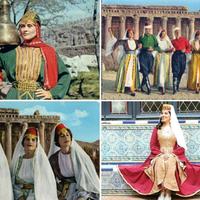Palestinian Embroidery
Palestinian|stitching art
|רקמה
Palästinensische Stickerei
Palestinian Embroidery
Bordado palestino
Broderie palestinienne
Palestinskt broderi
巴勒斯坦刺绣
فن التطريز: رنا: والله أهلا وسهلا فيكي يا ندى.
art|embroidery|Rana|I swear|welcome|and welcome|with you|oh|Nada
فن|ה embroidery|||||בך||ندى
The art of embroidery: Rana: By God, you are welcome, Nada.
The Art of Embroidery: Rana: Bye.
A arte do bordado: Rana: Por Deus, de nada, Nada.
أسماء: وفيكي.
Names|in you
|ובך
Asma: And Vicky.
Namen: Vicky.
Asma: E Vicki.
أسماء: كيف حالك؟ رنا: الحمد لله.
|how|you||praise be to God|to God
Asmaa: How are you? Rana: Praise be to God.
Namen: Hoe gaat het? Rana: Godzijdank.
Asma: Como você está? Rana: Graças a Deus.
أسماء: شو ها الفن الحلو، من وين جايبتيهم؟ رنا: آه، هاي الآورنه، والله هذه تطريز فلاحي، خالتي عملتلي إياها.
|what|this|art|beautiful|from|where|got them||ah|this|embroidery|and والله||embroidery|peasant embroidery|aunt|made me|it
||זה|האמנות||||הבאת אותם||||העורנה||||חקלאי|דודתי|עשתה לי|
Asma: Shu Ha, sweet art, where did you get them? Rana: Oh, this is the Orena, and by God, this is agricultural embroidery. My aunt made it to me.
Namen: Shu Ha zoete kunst, van waar breng je ze? Rana: Ah, Hai Aornah, God, dit is een borduurwerk van de boer, mijn tante werkte voor haar.
Asmaa: O que é essa doce arte, de onde você a tirou? Rana: Ah, essa é a Orna, e por Deus, isso é um bordado camponês, minha tia fez para mim.
أسماء: آه، من وين خالتك؟ رنا: خالتي أصلها من القدس.
|||where|your aunt||my aunt|her origin||Jerusalem
||||דודתך|||אֲרוּצָה||
Asmaa: Oh, where is your aunt from? Rana: My aunt is originally from Jerusalem.
أسماء: آآه، وبتعرفي يعني كيف بيعملوه؟ رنا: آه، فيه بتلاقي بكتب فيها النقشات الفلاحية وممكن إنتي تنقي النقشة اللي بدك إياها.
|Ah|and you know|||they do it|||there|you find|I write|in it|patterns|agricultural patterns|and you can|you|choose|pattern|that|you want|
|אה|ואת יודעת|||עושים את זה|||||אני כותב||הדוגמאות|החקלאיות|||תבחרי|הדוגמה|||
Asmaa: Aah, and you know how do they do it? Rana: Oh, in it you come across books containing the peasant inscriptions, and you can get the inscription you want.
Asma: Ah, weet je hoe je hem kunt verkopen? Rana: Ah, wanneer ik boeken ontmoet waarin gravures van boeren en je de discussie kunt zuiveren die je wilt.
أنا طلبت منها هاي.
I|I asked|her|this
Hi, I asked her.
أسماء: آه كتير حلوه.
||very|very nice
|||יפה
Asmaa: Oh, very good.
يعني ليه هادي الألوان اللي بستخدموها، إلها معنى، ولا أية لون بصح يستخدموا.
|why|these|the colors||they use it|it|meaning|or any|any color|color|really|they use
|||הצבעים||משתמשים בה||||آية||בְּסָהּ|
I mean, why are these colors they use, their meaning, and no color they use correctly.
Les Hadi betekent de kleuren die ze gebruiken, een godsbetekenis, en geen kleur correct gebruik.
رنا: هاي الألوان تقليديه، ألوان العلم الفلسطيني، الأسود والأحمر والأخضر.
||The colors|traditional|colors|flag|Palestinian flag|black|red|green
|||מסורתיים|צבעים|דגל||שחור|והאדום|והירוק
Rana: These are traditional colors. The colors of the Palestinian flag are black, red and green.
أسماء: آآه، كتير كتير حلو.
|Ah|||
رنا: يحلي أيامك.
|sweetens|your days
|ממתיק|יומיך
Rana: Sweeten your days.

